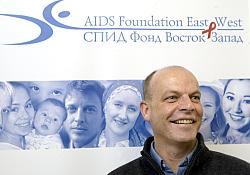
Marty Bell, currently head of the Moscow mission of the AIDS Foundation East-West, joined the U.S. Peace Corps right after graduating from the University of Massachusetts in Amherst in 1978 and was sent to Costa Rica and put his industrial engineering and operations degree to use by restructuring a bakery and making it profitable
Former Chaplain Plunges Back Into Life's 'Mess'
By Maria Levitov
Staff Writer
Vladimir Filonov / MT
As head of mission with AIDS Foundation East-West, Bell works on programs to educate youths and prisoners about HIV and AIDS.
As an 8-year-old growing up in a Boston suburb, Marty Bell watched one of the first news clips about President John F. Kennedy's newly established Peace Corps on television.
"They showed this fellow sitting in the middle of a village in Africa, teaching English or planting gardens ... I can't remember exactly, but I thought that was a really neat thing to do," Bell says.
The television images sparked a curiosity that has taken the American from Costa Rica to Canada, from Central Asia to Siberia, and most recently, to his current job as head of the Moscow mission of the AIDS Foundation East-West.
Bell joined the U.S. Peace Corps right after graduating from the University of Massachusetts in Amherst in 1978. He was sent to Costa Rica and put his industrial engineering and operations degree to use by restructuring a bakery and making it profitable.
"I lived and worked at an orphanage of 250 boys and a group of Catholic priests in Costa Rica," Bell recalls. "It was there that I began to ask some larger questions about why people do what they do and the choices they make."
Bell turned to theology for answers. After two years with the Peace Corps, he enrolled in a Christian studies program at Regent College in Vancouver. Canada became Bell's permanent home in 1981, when he graduated and got a job as a campus chaplain at the Inter-Varsity Christian Fellowship of the University of British Columbia in Vancouver.
"The university is surrounded by water on three sides, overlooking the mountains," Bell says. "It was a great place to get involved in students' lives, encouraging them to keep asking questions."
Bell enjoyed his work, but had to ask himself where he would go from there. "Sometimes, you can choose jobs that take you outside the world," says Bell, who himself came to realize that he liked "to be in the middle of all the mess."
He turned his mind to getting an MBA from Boston University. After graduation, in 1988, Bell returned to Canada to supervise personnel for Case Products International, a small company in Ontario. But he was not meant to stay in the private sector for long.
"The financial situation [at Case Products International] changed and, essentially, the job became to shut the company down," says Bell, who then returned to Inter-Varsity Christian Fellowship's Toronto headquarters as chief operations officer.
It was while at Inter-Varsity that Bell's desire to travel reignited. When organizing a large annual conference for the organization, Bell met some Americans working with Pacific Resources, a fluorescent light producer, based in China. They had just opened an office in Central Asia and offered him a job.
Bell accepted and moved to Bishkek, capital of Kyrgyzstan, without hesitation. However, the fluorescent light factory never materialized.
"In 1995, we couldn't find enough clean money locally," Bell explains.
Bell stayed in Central Asia, taking on a consulting project with Mercy Corps. The nonprofit organization contracted Bell in 1996 to oversee a loan-for-farmers project in Osh, a small city in southern Kyrgyzstan.
Enjoying the slow pace of life, he immersed himself in the local culture.
"I ate lagman [a thick soup] for lunch everyday," recalls Bell, who also tried studying Kyrgyz and Uzbek.
"I am not a linguist," admits Bell, who often got into sticky situations, especially with taxi drivers.
"Even when I didn't understand anything they said, I'd just nod and they would keep on talking," recalls Bell. "My sons were always so embarrassed when I did this."
Bell's sons, Jonathan and Daniel, were five and seven when the family moved to Kyrgyzstan. They each left the country at the age of 14 to attend a boarding school in England.
During his seven years in Osh, Bell once again returned to Inter-Varsity Christian Fellowship, this time to recruit teachers for Kyrgyzstan and Kazakhstan. He also managed the Osh Institute of Western Education.
In 2003, Bell took a sabbatical in England to be closer to his sons.
"I studied Russian at Bristol University and wanted to continue," says Bell, who ended up enrolling in a language program in Novosibirsk.
Once the language course was over, Bell returned to Kyrgyzstan with the intention of looking for a job in Russia. An Internet search bore fruit.
"I flew to Moscow for an interview with the AIDS Foundation East-West, was hired and started the next day," Bell says.
Today, he works on programs designed to educate youths and prisoners about the dangers of HIV and AIDS.
"It's a steep learning curve, since I don't have a medical background," Bell says. "But I learn a great deal from our staff."
The World Health Organization's gloomy estimate that 10 million Russians will die of AIDS over the next 15 years has motivated Bell to continue learning.
"Very shortly, every family in Russia is going to be affected [by HIV]," Bell says. "I can't imagine working on anything more important."
